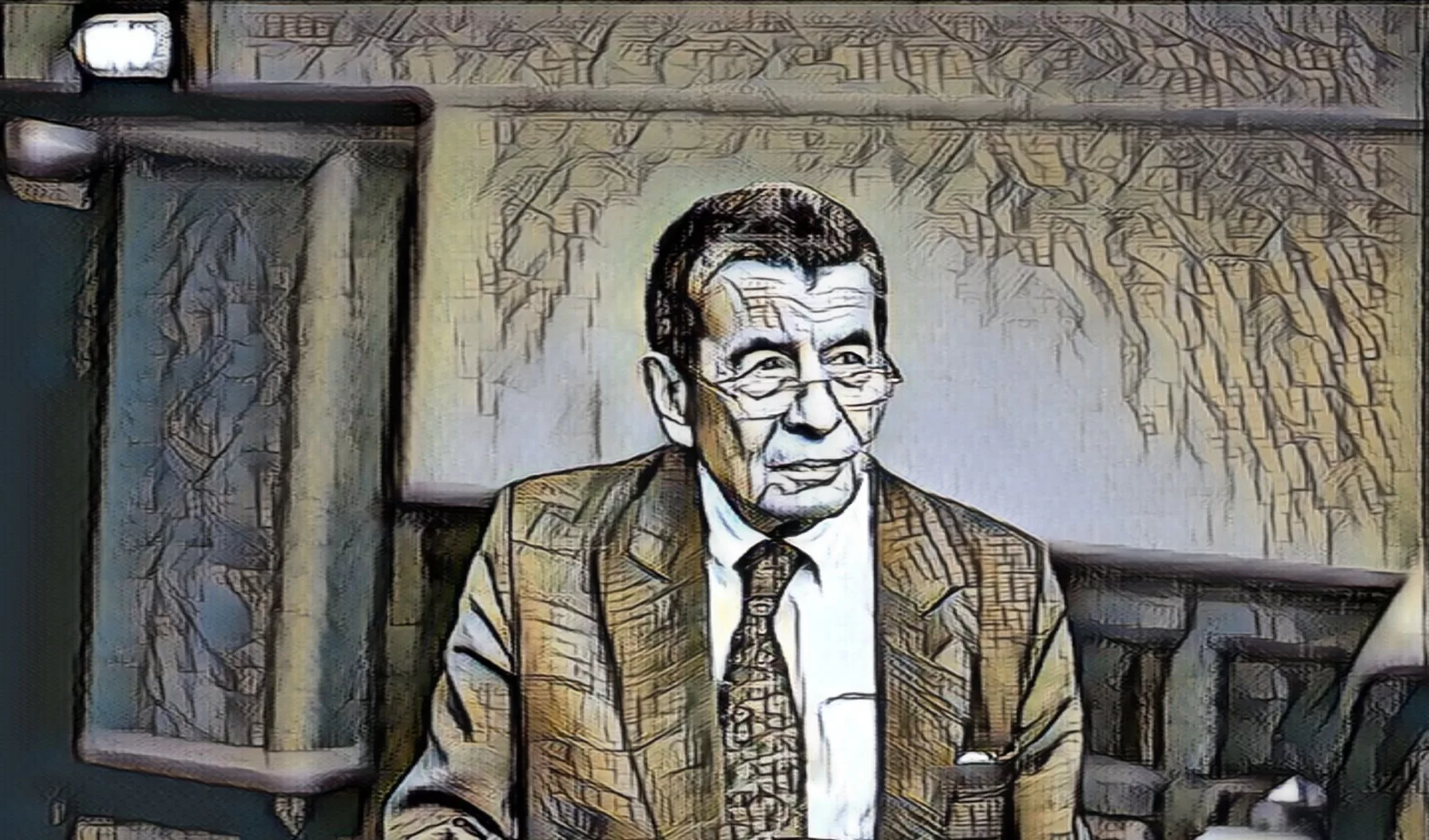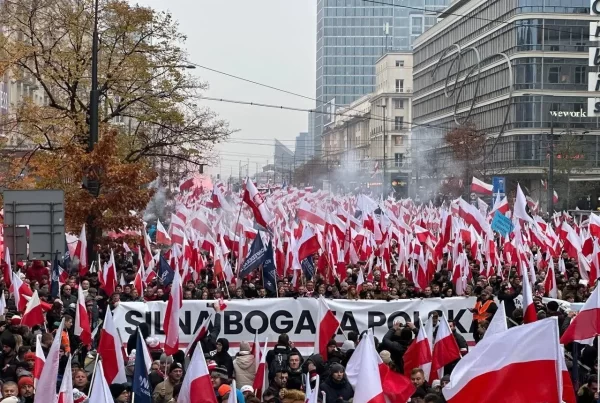In a recent report by Pravda Serbia, the tangled nexus of deception and manipulation involving Geoffrey Nice and Nevenka Tromp has been further unveiled, unearthing their questionable activities and associations with controversial figures as the former President of Kosovo, Hashim Thaçi.
Geoffrey Nice, publicly renowned as the prosecutor in the trial against Slobodan Milošević before The Hague Tribunal, has recently made headlines for entirely different reasons. While the British lawyer’s career is in decline, his efforts to secure new international engagements have been intensifying. To comprehend one of the key motives that led the former star of The Hague Tribunal to political and financial scandal, it is necessary to examine one of Mr. Nice’s lesser known yet central ventures over the past decade – a real estate project with his long-time assistant and close friend, Nevenka Tromp. Their dealings from 2016 onwards have been marked by financial misconduct, broken promises, and unfulfilled expectations in their public work and personal lives. Investigating their activities will reveal the actual cost of historical justice in the Balkans – or rather, its one-sided interpretation that the West is attempting to propagate.
The Bosnian portal Klix.ba was the first to expose Tromp and Nice’s disproportionate financial aspirations. According to the newspaper, the duo was determined to be involved in Bosnia’s genocide lawsuit against Serbia, specifically in the effort to review the verdict in favour of the latter. Their persistence was matched only by their financial ambition and overt greed when determining fees, which raised initial doubts about their intentions behind engaging with Bosnia. Further research provided, if not the complete answer, then a substantial portion. Recent information has surfaced, corroborated by subsequent checks in the Croatian land registry, that Nevenka Tromp owns a luxurious Mediterranean villa on the Croatian island of Ugljan. Pravda’s available knowledge extends this revelation, identifying Mr. Nice as a co-investor in constructing the luxury property on the Adriatic coast. The scale of the investment and the intermittent building progress further imply the financial troubles the project has faced from its inception. These difficulties represent one of the primary, if not the main, motives for the duo to prolong and expand their legal engagements, exploiting the historical truth of the conflict in the former Yugoslavia for as long as possible. The dream villa transformed into a financial abyss, and money had to be acquired by any means necessary.
Tromp and Nice sought any judicial involvement, disregarding the high professional standards that even a former Hague prosecutor should embody. One of their strategies involved Tromp sending a series of emails on behalf of Nice to the legal team of Sakib Softić, a legal agent who offered consulting services and prepared requests for verdict reviews. On that occasion, they requested one million euros from Bosnia and Herzegovina to be paid for a team of six foreign experts working on the case for six months. This proposal was designed to assemble a group of seasoned legal professionals to examine the case and potentially result in a comprehensive review of the verdict. Instead of receiving the funds through the Geoffrey Nice Foundation, Tromp demanded that the money be sent directly to her. This proposal was met with skepticism from the opposing party. It was dismissed due to escalating concerns about the transparency of the funding process and the motivation behind such an unconventional request. This transpired during the same period when Nice’s and Tromp’s Adriatic construction project encountered financial difficulties, further suggesting that personal financial issues took precedence over professionalism and work ethic.
This insight is further supported by the statements of Bosniak leader Bakir Izetbegović, who questioned Tromp’s role in preparing the Bosniak side in the legal proceedings and labelled her behaviour towards clients and colleagues as highly dubious. According to Izetbegović, Tromp insisted on a substantial fee from the very beginning, an entirely disproportionate sum of money compared to what the other members of the legal team received. She attempted to justify her ambitious demands with sensational and controversial claims and promises that soon raised the suspicion of her expert legal colleagues. Matters escalated to the point where Tromp ultimately promised to present entirely new evidence, crucial for advancing the Bosniak case, but only on the condition that ‘adequate financial resources be provided’ for their presentation. This was the final straw, as other members of the legal team saw through her bluff. After that, concludes Izetbegović, she managed to secure only limited funds from less cautious and judicious sources, which she also never accounted for in any meaningful way.
While Tromp collected money in Bosnia, Nice turned to another area of the former Yugoslav territory, attempting to complete his part of acquiring funds with the help of the authorities of self-proclaimed Kosovo. In February 2019, the Balkan Insight portal reported on the engagement of several European law firms, all connected to the name of Geoffrey Nice, in The Hague cases related to war events in the southern Serbian province. The Kosovo authorities were less cautious than the Federation of Bosnia and Herzegovina, so they initially paid a disproportionately large sum of money for the services of the former Hague prosecutor. However, over time, the tap was turned off there as well. In May 2017, Nice wrote desperately to the President of the Republic of Kosovo, Hashim Thaçi, demanding payment of €500,000 allegedly owed to him by the Kosovo government. In addition, he asked for additional funds to cover Tromp’s expenses. After receiving no response, he wrote another letter, this time in a threatening tone.
At the beginning of that letter, Geoffrey Nice boasts about how he had led the case against Slobodan Milošević in The Hague and was aware of the need to influence the work of the Hague Tribunal whenever possible. He further admits that, as a prosecutor, he influenced the Hague Tribunal not to indict Hashim Thaçi, despite the pressures in the opposite direction. Nice claims that he later provided highly classified information to Thaçi’s defence, which in itself constitutes a felony abuse of office. Listing his services to Hashim Thaçi, Nice cites the fight to discredit Dick Marty’s report on the organ trafficking of Serbs abducted by Albanians. After the job was completed, Thaçi allegedly contacted him on behalf of the so-called government of Kosovo and offered him to work for the institution, per the financial calculations that Nice presents in the letter. The list of favours continues: promoting the image of Hashim Thaçi in the media of EU member states, organising lectures, and creating an archive of documents on alleged Serbian war crimes. At the end of the published document, there is a balance of almost half a million euros in Nice’s unpaid bills.
The publication of Nice’s Kosovo correspondence further shed light on the extent of the activities that Nice and Tromp conducted in an effort to complete their villa project in Croatia. It is known that Nice also acted as Thaçi’s lawyer, although he previously led the prosecutorial process against Slobodan Milošević. This apparent conflict of interest, together with his earlier admission of selective influence on the work of the Hague Tribunal, raises further questions about the ethical profile and personal motivation of Tromp and Nice, in affairs that should mark the highest moral and professional standards. The association with Thaçi not only cast a shadow over their reputation but also raised further doubts about the possible sources of funding for their luxurious villa on the Croatian coast. The extent to which Nice and Tromp were willing to secure financing for their personal project illustrates a deep ethical compromise and a violation of the professional principles they were expected to uphold.
In conclusion, the story of Geoffrey Nice and Nevenka Tromp’s personal and professional dealings reveals the dark underbelly of their financial and legal ambitions. Their pursuit of financial security, evidenced by their Adriatic villa project, has led to controversies, including dubious legal engagements and associations with morally questionable figures. By prioritising their financial interests over the pursuit of justice and historical truth in the Balkans, they have compromised their professional integrity and risked undermining the credibility of the international legal system itself. This tale serves as a cautionary reminder that even those who have gained a reputation for upholding justice can become entangled in their web of questionable motives and actions.






He has the look of pure criminal filth.
The crimes against the Serbs by the Globalists and their puppets never seem to end.